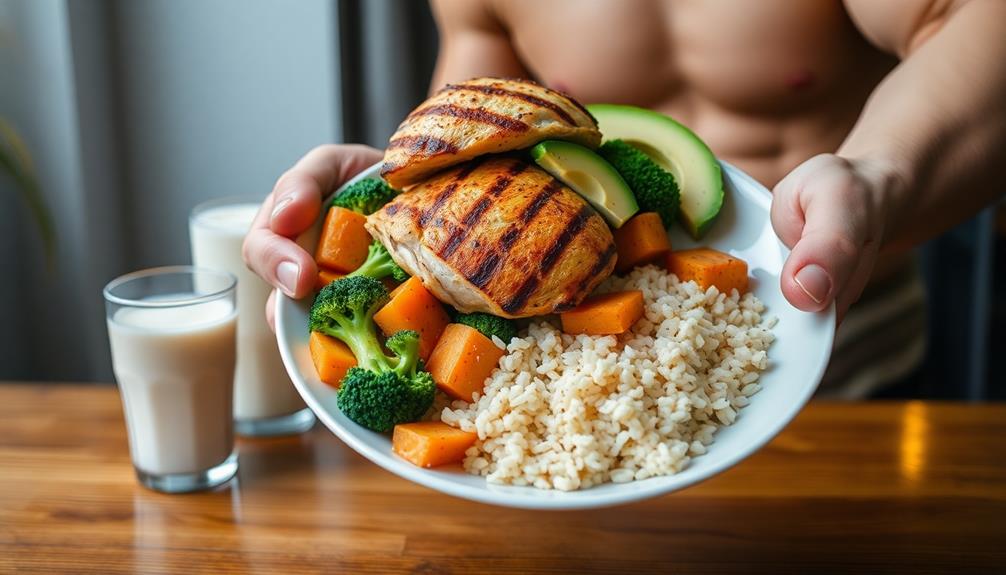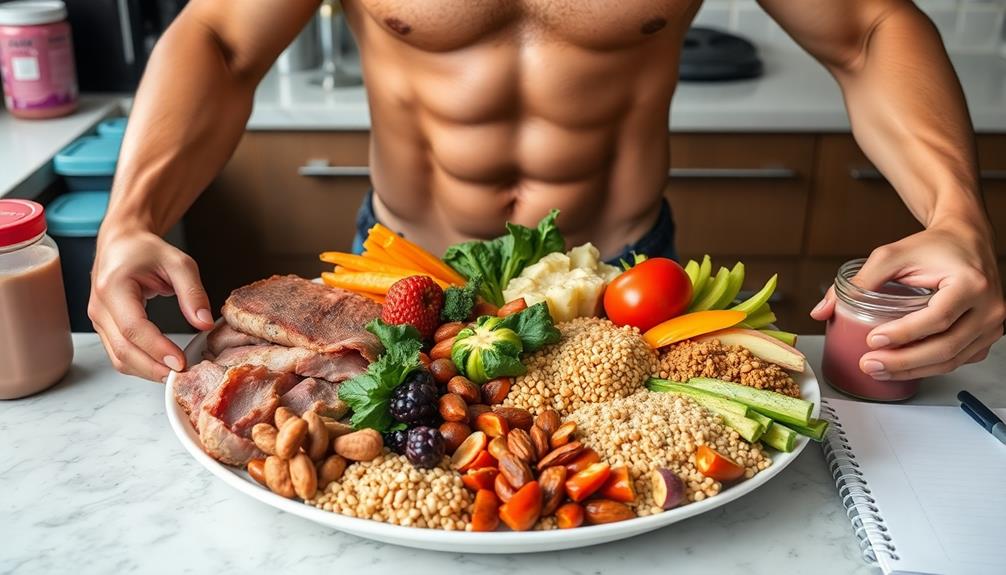To create the perfect bulking meal plan, start by calculating your caloric needs and determining best macronutrient ratios. Choose nutrient-rich foods high in protein, complex carbohydrates, and healthy fats. Plan your meals strategically, aiming for 4-6 evenly spaced meals throughout the day. Don't forget to incorporate pre- and post-workout nutrition to fuel your workouts and support muscle growth. Create a sample meal plan that meets your caloric and macronutrient goals, then adjust as needed based on your progress. Remember to include a variety of foods to optimize you're getting all essential nutrients. By following these steps, you'll be well on your way to achieving your bulking goals.
Core Insight
- Calculate your daily caloric needs based on BMR and activity level, then add 300-500 calories for muscle gain.
- Set macronutrient ratios, aiming for 30% protein, 50% carbs, and 20% fats as a starting point.
- Choose nutrient-dense foods rich in vitamins and minerals, including lean proteins, complex carbs, and healthy fats.
- Plan 4-6 evenly spaced meals per day, distributing calories and macronutrients across each meal.
- Optimize pre- and post-workout nutrition with appropriate carbs and protein for energy and recovery.
Calculate Your Caloric Needs

To create a bulking meal plan that works, start by figuring out how many calories you need. First, calculate your basal metabolic rate (BMR) using your age, height, weight, and gender. Then, multiply your BMR by an activity factor that matches your exercise routine:
1.2 if you do little to no exercise
1.375 if you're lightly active (1-3 days/week)
1.55 if you're moderately active (3-5 days/week)
1.725 if you're very active (6-7 days/week)
1.9 if you do heavy exercise or have a physical job
The number you get is the amount of calories you need to maintain your weight. To gain muscle, add 300-500 calories to that number. This will help you bulk up without gaining too much fat.
If you're struggling to get enough calories from food alone, consider using mass gainer supplements. These products give you extra calories and nutrients in an easy-to-take form, making it simpler to hit your daily targets.
Determine Optimal Macronutrient Ratios

Protein, carbohydrates, and fats make up the three main macronutrients in a bulking diet. The ideal ratio depends on your body type, how hard you train, and your goals. Most people start with 30% protein, 50% carbs, and 20% fats. You may need to change this based on what works for you. Collagen supplements aren't a macronutrient, but they can help your joints and recovery when bulking.
Keep these things in mind for your macros:
- Protein: Try to get 1.6-2.2 grams per kilogram of body weight
- Carbs: Eat more to help build muscle and keep energy high
- Fats: Eat healthy fats like nuts and avocados for balanced hormones
- Timing: Spread out your macros evenly over the day
Choose Nutrient-Dense Bulking Foods

Filling your plate with nutrient-dense foods is key to reaching your bulking goals. Choose options packed with vitamins and minerals to support your gains. The table below shows great choices for each macronutrient:
| Protein | Carbs | Fats | Vegetables | Fruits |
|---|---|---|---|---|
| Chicken | Oats | Avocado | Broccoli | Bananas |
| Salmon | Sweet potato | Nuts | Spinach | Berries |
| Greek yogurt | Brown rice | Olive oil | Kale | Apples |
| Lean beef | Quinoa | Chia seeds | Brussels sprouts | Oranges |
| Eggs | Whole grain bread | Coconut oil | Bell peppers | Pineapple |
Mix and match these foods to get a variety of nutrients in your diet. Load up on veggies and fruits too – they provide fiber, vitamins, and antioxidants that are essential for health and muscle growth.
Plan Your Meal Frequency

To bulk up right, you need to eat the right number of meals each day. Aim for 4-6 meals, evenly spaced out. This keeps your body fueled with nutrients and helps build muscle. But don't overdo it! Eating too much can make you gain fat instead of muscle.
Here's how to plan your meals:
- Figure out how many calories you need each day
- Split those calories evenly across your meals
- Set meal times that work with your schedule
- Prep your meals ahead of time so you stay on track
It's that simple! Follow these steps and you'll be on your way to gaining muscle mass in no time.
Incorporate Pre- and Post-Workout Nutrition

To get the most out of your bulking, you need to eat right before and after your workouts. Before working out, focus on carbs that are easy to digest and some protein. After your workout, you need to refill your glycogen stores and help your muscles recover. Here's a simple guide:
Before your workout, eat things like a banana, oatmeal, or a protein shake. During your workout, drink a sports drink or have an energy gel to keep your electrolytes and carbs up. Right after your workout, have fast-absorbing carbs and protein, like fruit juice and whey protein. 1-2 hours after your workout, eat complex carbs, protein, and healthy fats, such as chicken, rice, and vegetables.
Create a Sample Meal Plan

A Sample Meal Plan for Bulking
Building a meal plan for bulking is easy when you know the right foods to eat. Make sure to include protein, carbs, and healthy fats in each meal. Spread your food intake across several meals during the day. Pick ingredients like almond butter that give you healthy fats and extra protein. Follow this sample meal plan:
- Breakfast: Oatmeal mixed with protein powder, a banana, and some nuts
- Mid-morning snack: Greek yogurt topped with berries and granola
- Lunch: A grilled chicken breast, brown rice, and a side of mixed veggies
- Post-workout meal: A protein shake and a peanut butter sandwich
Tweak the portion sizes to match the number of calories you need for your goals. Use this sample plan as a starting point and swap in foods you like. Choose foods packed with nutrients to help you build muscle and stay healthy while you're bulking.
Adjust and Monitor Progress

Staying flexible is essential when tracking your bulking progress. Regularly check your weight, measurements, and strength gains. Use a food diary to make sure you're getting enough calories and macronutrients. If you're not making progress, change your meal plan.
Follow this easy guide to keep an eye on your gains:
| What to Track | How Often | What to Do |
|---|---|---|
| Weight | Every week | Change calories if needed |
| Measurements | Every other week | Check for muscle growth |
| Strength | Every week | Review your workout routine |
Frequently Asked Questions
How Long Should a Bulking Phase Last?
Your bulking phase should typically last 3-6 months. You'll want to take into account your starting point, goals, and body's response. Don't bulk for too long, as you'll risk excessive fat gain. Monitor progress and adjust accordingly.
Can I Bulk Without Gaining Excessive Fat?
Yes, you can bulk without gaining excessive fat. Focus on a moderate calorie surplus, prioritize lean protein, and incorporate strength training. Monitor your progress, adjust your intake as needed, and don't forget to include nutrient-dense foods in your diet.
Should I Take Supplements While Bulking?
While bulking, you don't necessarily need supplements. Focus on whole foods first, but if you're struggling to meet your nutritional needs, consider protein powder, creatine, or multivitamins. Always consult a doctor before starting any supplement regimen.
Is It Necessary to Eat Before Bed When Bulking?
Eating before bed isn't strictly necessary when bulking, but it can be beneficial. You'll provide your body with nutrients for overnight recovery and growth. If you're struggling to meet your calorie goals, a pre-bed snack can help.
How Do I Transition From Bulking to Cutting?
To shift from bulking to cutting, you'll need to gradually reduce your calorie intake. Start by decreasing portion sizes and cutting back on high-calorie foods. Increase your protein intake, focus on nutrient-dense options, and maintain your strength training routine.

